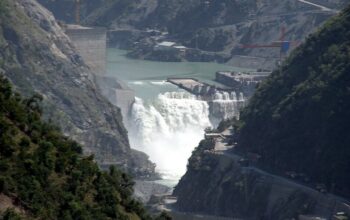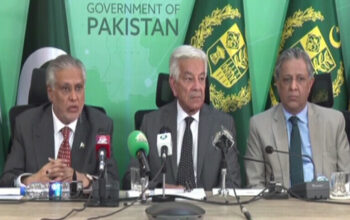By Staff Reporter
ISLAMABAD: Pakistan announced a sweeping set of retaliatory measures against India on Thursday, including the immediate closure of the Wagah border crossing, shutting down its airspace for Indian airlines and the suspension of multiple bilateral agreements, in response to what it called “unilateral, unjust, politically motivated, highly irresponsible, and illegal” actions by New Delhi.
The sharp retaliation follows a deadly attack on April 22, 2025, in Pahalgam, a scenic town in Indian-occupied Kashmir’s Anantnag district, that New Dehli has blamed on Pakistan — a charge Islamabad has dismissed as “baseless”—plunging the nuclear-armed neighbors into one of their most severe confrontations in years.
Following the attack on tourists, India quickly pointed the finger at Pakistan, alleging evidence of cross-border infiltration and holding Islamabad “directly responsible” for the assault.
The National Security Committee, chaired by Prime Minister Muhammad Shehbaz Sharif and attended by the top military leadership, dismissed these accusations as “baseless and devoid of logic or reason” during an emergency meeting, insisting that India should “take full responsibility for its failure to protect lives” rather than using the tragedy to malign its neighbor.
“Linking the Pahalgam attack to Pakistan without credible investigation or verifiable evidence is baseless and devoid of logic or reason,” a statement issued after the meeting said.
It accused India of using the attack as a pretext to deflect attention from its own security lapses and its policies in Kashmir, which the statement refers to as “Indian Illegally Occupied Jammu and Kashmir” (IIOJK).
“India must refrain from using incidents like Pahalgam to advance its political agenda through blame games and systematic exploitation, which only increase tensions and obstruct peace and stability in the region.”
The confrontation has thrust the nuclear-armed rivals into one of their gravest crises in years, threatening to unravel decades of fragile accords like the Indus Waters Treaty and the Simla Agreement.
The roots of this conflict stretch back to 1947, when the partition of British India left the Muslim-majority princely state of Jammu and Kashmir contested after its Hindu ruler chose to accede to India. That decision sparked the first of several wars, ending with a UN-brokered ceasefire in 1949 that split the region along the Line of Control. Both nations claim Kashmir entirely, and a promised UN plebiscite for Kashmiri self-determination remains unfulfilled.
Tensions have simmered ever since, boiling over in wars in 1965 and 1971, and again in 2019 when India revoked Kashmir’s semi-autonomous status under Article 370, a move Pakistan condemned as illegal.
Pakistan’s response goes beyond rhetoric, with a series of concrete actions. The Wagah border crossing near Lahore, famous for its daily flag-lowering ceremony, will be closed immediately. A grace period until April 30, 2025, allows those who have legally crossed to return, after which the route will be sealed indefinitely. The closure halts a vital link for trade and people-to-people contact.
All visas issued to Indian nationals under the SAARC Visa Exemption Scheme (SVES) are suspended, except for Sikh pilgrims visiting religious sites. Non-pilgrim Indian nationals in Pakistan under SVES must leave within 48 hours.
Indian defense, naval, and air advisors in Islamabad, along with their staff, have been declared persona non grata and must depart by April 30, 2025. The Indian High Commission will be capped at 30 diplomats and staff starting on that date. Indian airlines are barred from Pakistan’s airspace effective immediately, and all trade with India—including goods transiting through Pakistan via third countries—is suspended.
The stakes rose further with Pakistan’s reaction to India’s threat to suspend the 1960 Indus Waters Treaty, which governs the shared Indus River system critical to both nations’ agriculture and hydropower. Pakistan called the move a violation of a pact that permits no unilateral suspension, declaring water a “vital national interest” for its 240 million people and any disruption an “act of war” to be met with “full national strength.”
“Pakistan strongly rejects India’s announcement of suspending the Indus Waters Treaty. This is an international treaty brokered by the World Bank, which does not allow unilateral suspension,” the statement said. “Any attempt to block or divert Pakistan’s water flow or to usurp lower riparian rights under the Treaty will be considered an act of war and responded to with full national strength.”
The 1972 Simla Agreement, which set the Line of Control and mandated bilateral resolution of disputes, also hangs in the balance, with Pakistan reserving the right to suspend it.
“Considering India’s irresponsible behavior and disregard for international conventions, UNSC resolutions, and global obligations, Pakistan reserves the right to suspend all bilateral agreements with India, not limited to the Simla Agreement, until India ceases cross-border violence and honors international laws and UN resolutions on Kashmir.”
The statement framed India’s accusations as part of a broader pattern of aggression. “India’s worn-out narrative of victimhood cannot conceal its own role in promoting terrorism on Pakistani soil nor distract from the state-sponsored oppression and human rights violations in IIOJK,” it added.
The committee reaffirmed Pakistan’s support for the Kashmiri people’s “inalienable right to self-determination” as enshrined in UN resolutions, a position it has maintained since 1947.
“Kashmir is an unresolved dispute between Pakistan and India, recognized through numerous UN resolutions. Pakistan will continue to support the Kashmiri people’s right to self-determination.”
The statement said Pakistan and its Armed Forces are fully capable and prepared to defend the nation’s sovereignty and territorial integrity against any aggression. “Any threat to Pakistan’s sovereignty or the safety of its people will be met with a full and appropriate response.”
Copyright © 2021 Independent Pakistan | All rights reserved




